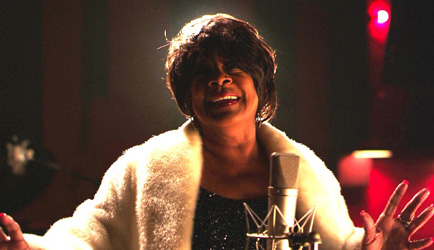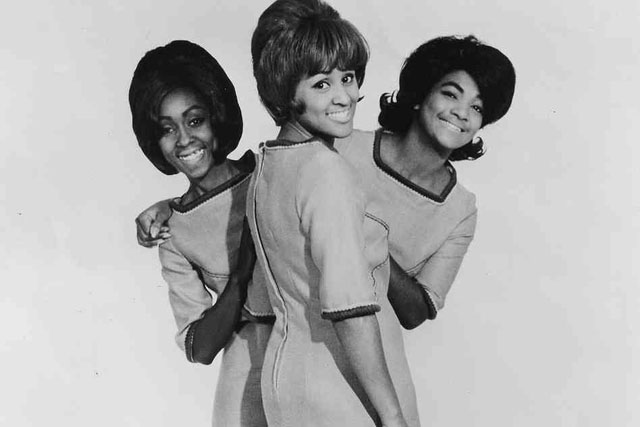Culture
Movie Review: “20 Feet From Stardom”
By: Scott Pfeiffer
Posted on:
"And the colored girls go, doo do doo, doo do doo, doo do doo…"
This line from Lou Reed’s classic "Walk On The Wild Side" leaps out as the song plays over the opening credits of 20 Feet From Stardom, a new documentary about backup singers and, more broadly, about dreams.
It’s a line that makes some people "uncomfortable," as Lynn Mabry–one of the backup singers who’s meant a lot to me personally–says with a knowing smile. She knows Lou is just keeping it real.
The idea of this invigorating movie is, let’s let those "colored girls" tell their stories, from the golden age of the backup singer in the 60s and 70s, through to their decline in the modern era.

Jo Lawry, Judith Hill and Lisa Fischer
Along the way there is plenty of electrifying performance footage. We see Ms. Mabry in action with Talking Heads in Stop Making Sense, one of the more important films in my young life. The implicit point that movie made—that black women are an indispensable part of the community—surely molded my politics, as well as stirring the adolescent Scotty P. in other ways. We also see Claudia Linnear singing with Joe Cocker on the Mad Dogs and Englishmen tour and with George Harrison on the Concert for Bangladesh.
The director, Morgan Neville, has produced an impressive body of music films about everyone from Pearl Jam and Ray Charles to Iggy and The Stooges and Leiber & Stoller. In fact, what makes this documentary transcendent is that he gets the drama of the music.
When Merry Clayton returns to the studio where she sang the most galvanic backup vocal ever (in the middle of the night! in hair curlers!) in 1969, the filmmakers allow those tickling, eerie notes of "Gimme Shelter" to trickle in as though from the walls, and we rock fans break out in goose flesh. We know what’s coming: a vocal that makes real every apocalyptic vibe Mick and Keith ever imagined. "Rape! Murder!!" the young Clayton screams on the soundtrack as the filmmakers let the music fall away, leaving her voice naked.

Merry Clayton
In the early 60s, black women made records that burst with the life force; those great "girl group" records auteured by Phil Spector, "pocket symphonies for the kids."
In one moving scene, Neville reunites Darlene Love, one of Spector's greatest singers, with her old group, the Blossoms. Though they’re now in their 70s and they haven’t sung together in over 40 years, when they sing it’s so glorious that tears sprung to my eyes. We learn that it was actually The Blossoms who sang "He’s a Rebel." We’ve always thought of it as a Crystals record, because Spector put it out that way.
Indeed, Spector sabotaged Love’s career again and again. She is as high-spirited as ever, but her expression turns wistful as she sits in the studio and listens to her voice as a young woman. By the 1980s, she was cleaning houses when she heard a radio blast out her own atomic "(Christmas) Baby Please Come Home."

The Blossoms
Then there is Lisa Fischer. "She’s a “freak of nature," someone says. Indeed, listening to her otherworldly scat makes you rethink the verb "to sing." This is the sound of the heart and soul resonating with the universe.
The filmmakers linger on her. They like to hear her sing, and to bask in her smile, just as much as we do. She has sung backup for Luther Vandross and Sting, and The Rolling Stones have taken her out with them on every tour since 1989 (she takes the "Gimme Shelter" solo every night and acts as a foil for Mick). When we see her standing anonymously in line at FedEx, it’s hard to reconcile this rather nondescript woman with the full-force gale we see performing onstage with the Stones.

Lisa Fischer with Keith Richards and Mick Jagger
Whereas Fischer seems in full control and authorship of her vision and sexuality when she performs, not everybody is. It won't stop any presses to learn there was exploitation of backup singers by male music geniuses. There’s great footage of Ray Charles and the Raelettes, and even though it’s not mentioned in the film, I couldn’t help thinking of that old adage: To be a Raelette, you had to “let Ray.”
Indeed, watching the Ikettes’ turbo-charged booty-shaking now, a male viewer feels conflicted. You’re stirred, but then you think about Ike Turner’s bald exploitation and the mood sours.
I guess the issue with sexuality is always whether it’s self-expression or even self-exploitation. After all, Claudia Linnear posed for Playboy in the 70s for a photo spread titled Brown Sugar, and she doesn’t seem to have any regrets. In fact, according to some, Ms. Linnear was the inspiration for the Stones' "Brown Sugar," though some give those props to Martha Hunt (also in this film).

Claudia Linnear
So why didn’t some of these great singers "make it?" Of the stars interviewed, Bruce Springsteen offers some of the most thoughtful comments, talking about the leap it takes to make that walk to the front of the stage, measuring the distance not just in steps but in conceptual terms as well. To put your vision out there takes a certain ego, Springsteen admits with a chuckle.
For some, like Tate Vega at Motown, their solo careers just never caught fire. That was also true of Merry Clayton herself, though we see her sing a powerful version of Neil Young’s "Southern Man," right at the time when black women were standing up in America. As Ms. Clayton notes with acid in her voice, she made it a point to sing the hell out of Lynryd Skynrd’s "Sweet Home Alabama" as well.
Some are still working on their dream. There is Judith Hill, who sang backup for Michael Jackson, plays the piano and writes and sings, and by the evidence in this film, is a terrific artist (she also made an appearance on NBC's The Voice).
Most of these women seem happy. Lisa Fischer says she’s "good" with her life. Fittingly, there is a final, stirring "Lean On Me" led by Darlene Love, with Ms. Fischer, Jo Lawry from Sting’s band, and Judith Hill backing her up. What does it even mean to "make it" in life, anyway? Sometimes almost enough has to be good enough.
Black women have played a key, and too often unsung, role in rock ‘n’ roll. This movie adds a missing piece of that story. Maybe it will even kick-start some careers.
It also sends you out of the theater on a high, with Darlene Love in all her glory singing a supercharged "Fine, Fine Boy" onstage with one of her disciples, a deliriously happy Bruce Springsteen.

Darlene Love
Born in Athens, Ohio, Scott Pfeiffer has lived in Chicago since 1993. He did a minor in film at Ohio University back in the day. These days, he knocks about Chi-town, taking in film, music and theater. Read his other reviews at The Moving World.

